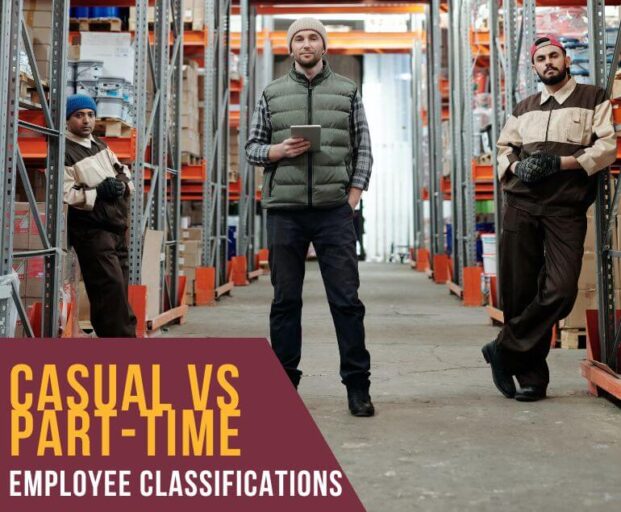As an employer, sometimes the question of whether you should hire a casual or part-time employee is not always clear.
For both the employer and the employee, casual vs part-time work has pros and cons, and it’s essential to understand the differences between them to make the right choice for your business.
What is Casual Work?
Let’s start by discussing what casual work entails. Casual workers are people you employ who work on an “as-needed” basis without a guaranteed minimum number of hours per week. They’re paid a higher rate of pay, known as a “casual loading,” to compensate for the lack of entitlements such as paid annual leave and personal leave. Under the Fair Work Act, the Casual loading is usually 25%, meaning if the award rate of pay for a role is $22, then the casual loading would be added on top of this (25% x $22 = $5.5) which would make the casual rate of pay would be $27.50 per hour.
According to the Fair Work Act, a casual employee doesn’t have an advance commitment on the length of their employment or their days or hours of work. Any employment must not have an agreed pattern of ongoing work.
What is Part-Time Work?
In comparison, part-time employees work a set number of hours each week and are entitled to the same benefits as full-time employees, such as paid annual leave, personal leave and sick leave. That being said, both rates of pay (both part-time and casual) require superannuation guarantee to be paid and also entitles the employee to long service leave after 10 years of service. Like casual employees, part-time employees are also entitled to request flexible working hours, but this will depend on the specific conditions of their employment agreement.
How Do I Classify Workers?
Now that we’ve defined the two types of work, let’s talk about how to make sure your employees are classified correctly according to Fair Work Australia.
To ensure correct classification, employers should consider the following factors:
1. The Nature of the Work
The nature of the work performed by the employee will contribute to whether they are classified as permanent part time vs casual. For example, an employee who is engaged on a regular and systematic basis is more likely to be classified as part-time, while an employee who is engaged on an irregular and unpredictable basis is more likely to be classified as casual.
2. The Number of Hours Worked
How many hours of work carried out by the employee will also determine whether they are classified as casual or part-time. For example, an employee who works a regular and set number of hours each week is more likely to be classified as part-time, while an employee who works irregular or unpredictable hours is more likely to be classified as casual.
3. How Long They Have Worked for You
The duration of the employment relationship can also be a factor that contributes to whether or not an employee is classified as casual or part-time. For example, an employee who has been engaged for a continuous period of time is more likely to be classified as part-time, while an employee who has been engaged for a short period of time is more likely to be classified as casual.
Misclassifying an Employee
It’s also important to understand the consequences of misclassifying an employee. If an employee is classified as a casual worker but should have been classified as a part-time employee, the employer may be liable for back pay and entitlements, as well as penalties and legal fees. This could mean you end up paying the loading as well as other entitlements.
To avoid these issues, it’s important to keep accurate records of the number of hours worked and the nature of the work. This will help to ensure that your employees are classified correctly and that you are in compliance with Fair Work Australia regulations.
Casual vs Part Time – The Pros and Cons
So, what are some of the problems employers face with employing casual and permanent employees?
One of the biggest challenges is managing the inconsistency of casual work. Because casual workers do not have a guaranteed minimum number of hours, it can be difficult for employers to plan their staffing needs in advance. This can result in a lack of stability and predictability for the business, as well as increased costs associated with constantly hiring and training new workers.
Another issue is the high cost of casual workers. Because they are paid a higher rate of pay to compensate for the lack of entitlements, it can be more expensive to hire casual workers than it is to hire part-time employees. Disputes can also arise from poor documentation and employers might end up having to pay other entitlements on top of the loading.
Permanent employees, on the other hand, can provide greater stability and predictability for a business. However, employers also face challenges with permanent employees, such as the difficulty of terminating the employment of a permanent worker and the costs associated with providing entitlements such as paid annual leave and personal leave.
Can I Keep my Employees as Casuals?
In 2021, Fair Work Australia provided guidance on this very question and it came down to providing the employee the option to become permanent annually under a process called Casual Conversion. They also have made it a requirement to provide the Casual Employee a guide known as the Casual Employment Information Statement.
These instructions are not prescriptive to small employers allowing them more flexibility. For more information please see our article on the Casual Employment Information Statement here.
Helping You Understand Your Role as an Employer
The choice between hiring a casual vs part time employee is not always an easy one. It’s important to understand the differences between the two types of work and to make sure your employees are classified correctly according to Fair Work Australia regulations. By keeping accurate records and being aware of the challenges associated with each type of work, you can ensure that you make the right choice for your business. The friendly team at Bishop Collins are here to help you understand your responsibilities as an employer. Get in touch with us today to see how we can help!







